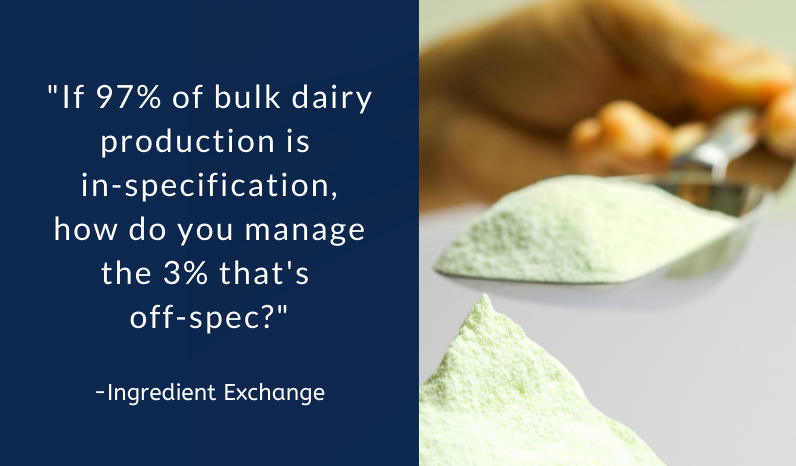If 97% of bulk dairy production is in-specification, how do you manage the 3% that’s off-spec?
One thing’s for sure, as long as production is up and running, manufacturing will continue to generate downgrade ingredients.
Clearing out the accumulating inventory often falls to an in-house product manager or salesperson. An easy fix for offloading the surplus is to notify a distributor list of end-users.
But selling your downgraded product involves more than emailing a list of buyers. It requires paying attention to your brand and the reputation you’ve worked hard to develop over the years and decades.
That’s where partnering with an ingredient trader makes a difference.
Read on to learn how your trading specialist will work with you to protect your brand and reputation throughout the ingredient selling process.
1.Target a specific end-user
If you want to clear out your downgraded inventory—your whey protein isolate (WPI) or cheese powder—narrowing the target market to qualified buyers is critical for protecting your brand.
As part of the selling process, your ingredient specialist will reach out to end-users from their network—people they know who’ll be interested in the product. This strategic approach minimizes the risk of the open market identifying the product’s origin.
2. Filter out existing customers
In addition to marketing your B-grade product to a specific audience, it’s critical to make sure your branded off-spec product doesn’t go to an existing customer.
Your ingredient-trading partner will work with you to identify your customer base and guard your brand identity. They’ll white-label your ingredients and tailor the marketing toward select non-customer buyers.
3. Manage packaging modifications
If you wish to sell your accumulating inventory, you most likely don’t want your branded product to show up on the market. To keep your company’s identity out of the process, you may have to modify your packaging.
For example, a manufacturer processes nonfat milk powder (NFDM). The product goes into branded bags. They discover a clumping issue and want to sell the problem inventory—but not in the existing packaging.
The ingredient specialist will manage the packaging conversion to ensure the manufacturer’s name isn’t associated with the off-specification ingredients. That includes:
- Converting the packaging
- Providing packaging destruction certificates and images
- Removing the company’s identification from the verification documents—such as certificates of analysis (COAs) and specification sheets
| PRO TIP |
| Talk to your ingredient trader early! |
It’s the ingredient team’s goal to get you the best return in the shortest time possible. That includes efficiently managing any packaging modifications to safeguard your brand. The sooner they can begin the selling process—while your product has a good shelf life—the sooner you get a return. |
4. Ensure verification anonymity
Whether your product is a fit for a human-food application or qualifies as animal feed, selling your downgrade inventory (and recovering cash) requires food inventory verification.
Of course, documents such as COAs and spec sheets are closely tied to your company.
Therefore, some manufacturers will supply bare-minimum product details to protect their brand—such as the quantity, simple analytics, or a vague description about why the inventory is off-spec.
However, this approach limits your options for finding the right buyer and recouping cash.
Your food trading partner will work with you to manage the verification process, including ensuring that your brand identity is secure.
Outsource your off-spec dairy production with confidence
For many food manufacturers, managing off-spec dairy ingredients—from clumping cheese powder to scorched particles in whole milk powder (WMP)—is a mammoth, ongoing task.
Managing the downgraded product in-house can be challenging. That includes putting your branded problem product on a trading list where a third party might re-offer it to an existing customer.
Alternatively, building a relationship with your ingredient specialist allows you to salvage your problem inventory with minimal effort on your end. They’ll take care of the complete process, including organizing the logistics, clearing the product out of your warehouse, and getting you the best return possible.
Additionally, they understand what it takes to build your brand and reputation. They’ll work with you at every point in the selling process to protect your company’s name.
